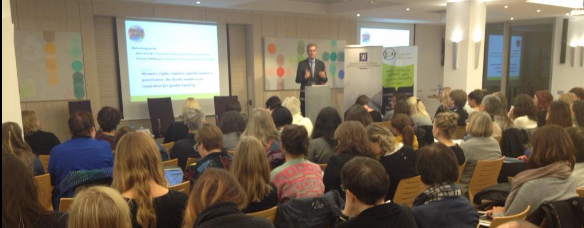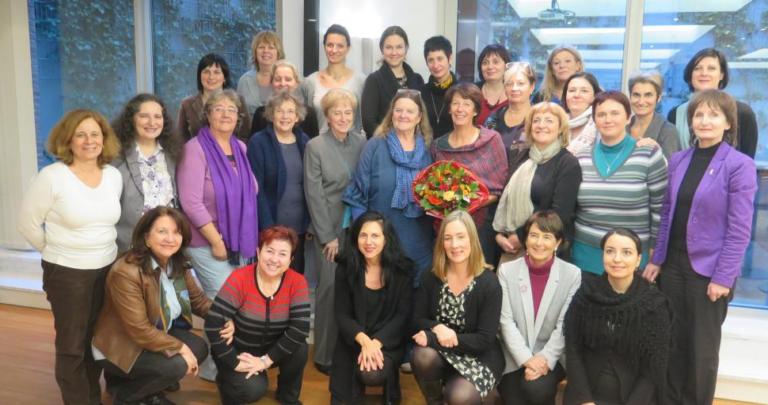[CELEM, Madrid, 23 May 2011] María José Carretero, Secretary of the Board of the Spanish Coordination for the European Women’s Lobby (CELEM), on 28 April moderated the Conference “Europe against Gender Violence. Good practice of the police”.
More than 70 women associations and numerous local and national policemen, met on11 April 2011 at the Hotel Catalonia Las Cortes in Madrid to attend the Conference “Europe against Gender Violence. Good practice of the police”. The opening speech was delivered by Mr. Diego López Garrido, State Department for the European Union.
In his intervention López Garrido spoke about his feelings having to contemplate the murder of women increased as a result of “the worst curse of the society in these times, sexist violence.” For the Secretary of State is necessary to broaden the perspective and analyze the phenomenon of gender violence in its political and social dimension.
The Secretary of State wanted to bring out in the opening the work done during the Spanish Presidency of the European Union. This Presidency has had as one of its key objectives “to introduce the fight against gender violence on the European agenda.” For this reason, Spain has favoured the recent approval of the European Pact for Gender Equality in the European Parliament. The Secretary of State also referred to the recent Directive against the trafficking of human beings, adopted by the Council and European Parliament.
In this regard, he added, “our country has been able to prioritize in this time three fundamental axes: the political impulse, the search for legal resolutions and last but not least, the police action, which deals specifically with the protection and attention to the victims.” Diego López Garrido concluded referring to the contribution that our country offers so-called “Protocols of action” from police and health personnel and the judiciary, the truly “daily face to this serious problem”.
Rosa Maria Fernandez Sansa, President of the Spanish Coordinator for the European Women’s Lobby (CELEM) in her presentation highlighted the importance of this day to “inform to feminist associations the work that is developing the Spanish and European institutions on gender violence at European level and try to weave this work with associations work.”
The first panel of the day “Good Practices of the Police”, chaired by the President of Women Lawyers, THEMIS, Angela Cerrillos, included speeches by Miguel Lorente, Delegate against Gender Violence, Jose A. Rodriguez, Director of Studies of the Office of Homeland Security and the María del Puy Zatón, Executive Advisor to the Secretary of State for Security and Carlos Cruz, Member of the Supreme Judicial Council and the Centre for Domestic and Gender Violence.
This panel emphasized the importance and the need to be attentive to the decisions taken by the European Parliament that the “agreement of reference for the Gender Violence” materializes into concrete actions. In our country the 29% of the murdered women of foreign origin are European, they move between countries, and their protection would be greater and better with a common strategy.
The Delegate in Gender Violence said: to leave “bad practices” is necessary “act on new standards” and “identify the answers,” all accompanied by educational measures and training. Lorente regretted that, according to surveys, only 1.5% of the Spanish population considers domestic violence as a “serious problem.”
In this same panel were the interventions of the speakers at the Ministry of Interior whoexplained with great clarity and simplicity the protocol of measures implemented by the Spanish police to pay attention to women victims of violence to report it. They are trying to move this protocol of good practices at European level.
Their interventions were extremely interesting, perhaps because they practices were less known and it was established a very suggestive dialogue between the table and the assistants, María José Carretero, Secretary of the Board of CELEM, moderated the second panel, devoted to “Media Vision” with the participation of Manuel Alcaide, Provincial Brigade of the Judicial Police, Ana María Muñoz, Captain of the Guardia Civil, Jesus Duva, chief editor of the newspaper “El País” and Cristina Pérez Fraga, director of the Association of Media Women (AMECO) and AMECOPRESS News Agency.
Manuel Alcaide began to explain, more in practice, the operational work in the police station to assist women victims of violence. Ana María Muñoz, Guardia Civil, meanwhile, began confessing his initial objection to the work of the media, their prior fear to face them. But now, she have changed the view, felt that those working with violence should learn to “use the media” when it comes to combat it.
Jesus Duva of “El País” referred to the words of the Civil Guard representative asking for more cooperation at both bodies of Interior when reporting crimes of violence against women. He acknowledged that although in the past had had plenty of mistakes by the media at the moment “they had been largely corrected, and the cooperation of society, the Police and Guardia Civil are very important to transmit to the society as closely as possible “the curse of the violence.” Cristina Pérez Fraga, director of a news gender agency specializing in news AMECOPRESS categorically assured that “journalistic malpractices” in the treatment of violence especially damages the women and their consequences, far from friendly or neutral have a enormous influence.
Finally, Carlos Carnero, Ambassador on Special Mission of the Secretary of State for the European Union, closed the event which he described as “very satisfactory.” He made a brief reflection of the role played by Spain in the Trio Presidency in the EU (Spain, Belgium and Hungary) which ends on 30 June ending with a reflection on the new stage that opens, full of uncertainties “but also opportunities,” with some rapid changes in our southern shores of the Mediterranean and play of forces, sometimes conflicting, in Europe. This force us be very attentive to the measures taken by the European Union for women’s equality.


